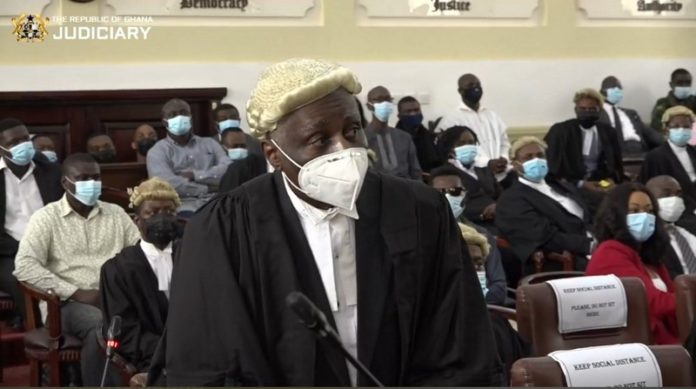The lead counsel for former President John Mahama in the election petition case, Tsatsu Tsikata, has accused one of the Supreme Court judges of harassing his client with his opinion.
“My lords with the Greatest of respects, you can’t use your opinion to harass the witness…,” Mr Tsikata stated.
The second witness for the petitioner in the ongoing presidential election petition at the Supreme Court, Dr Kpessa-Whyte, following cross-examination by the counsel for the 1st respondent, was subjected to a barrage of questions by members of the bench.
The witness claimed he and his co-agent for the petitioner were asked to leave the Electoral Commission’s strong room before the declaration of the 2020 presidential results. He was subsequently criticised by one of the seven judges for shirking his responsibility and failing to protect the interest of Mr Mahama.
He continued that the EC Chair, immediately after they left, declared the results without their consent.
During proceedings, the EC’s lawyer said: “I put it to you that you were not instructed by the Chairperson of the first respondent to leave the room.”
Seeking further clarifications on the matter, Justice Apau said: “Will it be right to say that by taking contrary instructions from the chairperson of the 1st Respondent, granted what you have said is true, you did not help the course of the petitioner who sent you there?”
Justice Apau indicated again that: “Then seriously speaking you did not take your training seriously. I want to be clear, you have gone to do a particular job, then instead of doing the particular job that sent you there you take instructions from somebody, then you leave your job. That is what I want to find that you did not help the petitioner.”
READ ALSO:
Introduction of NDC video evidence doesn’t help respondents in any way- ASEPA’s Mensah Thompson
Election Petition: Asiedu Nketia made us proud – Sammy Gyamfi [Audio]
Lead Counsel of the petitioner, Mr Tsikata raised an objection to the comment of the Justice saying: “My Lords, His Lordship is entitled to his opinion about what the petitioner did. In terms of factual evidence about what he did and the reason adduced.
“In terms of what the petitioner did and why he did it, he has answered the question so I don’t think he can be harassed with these opinions.”
Justice Apau denied harassing the witness saying “I am not harassing the witness, it is not my duty to harass him. I know that he has been sent there by the petitioner to do the job for him then somebody tells you to go to the petitioner and consult him if the petitioner could do the work he himself would have been there. That is what I would want to find out. How am I harassing him?”
Mr Tsikata insisted that he harassed the witness.
“Well you are harassing him because the witness has indicated it wasn’t just somebody, the witness has indicated that the Chairperson who is a Returning Officer was the person with whom his colleague had the conversation and on the basis of that they were sent to talk with the petitioner and he had given every account on why,” he said.


